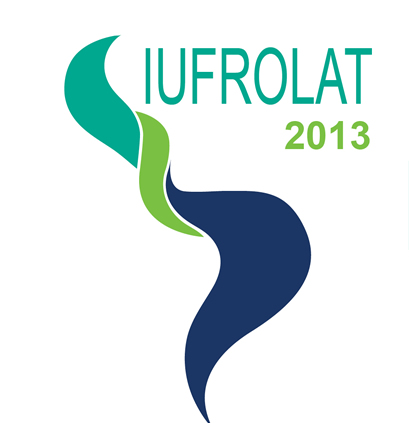Seeing the forest for the trees
Seeing the forest for the trees
Guest blog via Sri Lanka’s Ecosystem Conservation and Management Project ESCAMP; first published on Seeing the forest for the trees – ESCAMP
Forty Forest Department’s and other stakeholders participated in a training
organized and financed by International Union of Forest Research Organizations (IUFRO)
learning best restoration practices of forest landscapes

On Social Aspects of Forests and Forestry
IUFRO All-Division 6 Meeting at the 125th Anniversary Congress
An Interview with Division 6 Coordinator Tuija Sievänen of the Natural Resources Institute Finland
—– Read more…
Third IUFRO Latin American Congress IUFROLAT III

12-15 June 2013
San José, Costa Rica
Congress website: http://www.web.catie.cr/iufrolat/Iufro_ing.htm
This blog will present highlights and impressions from IUFROLAT III, the Third IUFRO Latin American Congress which starts today in the city of San José, Costa Rica and will run until Saturday, 15 June 2013. The Congress has been organized together with CATIE, the Agricultural Research and Higher Education Center, RIABM, the Iberoamerican Model Forest Network, FAO and several IUFRO members in the region. The overall theme of the Congress is “Forests, competitiveness and sustainable landscapes” and one of its major goals is to place relevant science-based information at the disposal of decision makers.
With up to 600 expected participants, IUFROLAT III has exceeded all expectations and has outnumbered previous regional Congresses by far. This clearly shows the extraordinary interest and need of scientists in Latin America to share and exchange information on the issues that are high on the agenda in the region concerning forest and landscape management, ecosystem services and climate change adaptation and mitigation, among others. The Congress languages being Spanish, English and Portuguese will further contribute to ensuring an excellent exchange of knowledge and experience.
IUFRO is placing particular emphasis on strengthening forest-related research in regions. Regional congresses are aimed to promote quality research as well as maintain the momentum of IUFRO activities in the five-year periods between IUFRO World Congresses in a certain region.
The great success of previous regional congresses, especially the First African Regional Congress held in Nairobi, Kenya, almost exactly one year ago, have confirmed the great need for IUFRO’s focusing on defined geographic areas. The first two IUFRO Latin American Congresses in Valdivia (1998) and La Serena (2006), both organized by INFOR, the Forest Research Institute of Chile, and the European Regional Congress that took place in Warsaw, Poland (2007), are further excellent examples.
IUFRO Board Meeting
Right before the Congress, the IUFRO Board (http://www.iufro.org/who-is-who/board/) held its annual meeting and important issues concerning the future of the network, its leadership, venues of world congresses and strategic guidelines are on the agenda. The decisions made at this Board meeting will pave the way for the next Board term starting after the next IUFRO World Congress in October 2014 in Salt Lake City, USA (http://www.iufro2014.com/).
IUFRO-SPDC Pre-Congress Training Workshop: Communicating Forest Research – Making Science work for Policy and Management
San José, Costa Rica, June 9-11
Prior to the Congress, IUFRO’s Special Programme for Development of Capacities (IUFRO-SPDC), formerly known as the Special Programme for Developing Countries in coordination with CATIE, carried out a training workshop for early-career scientists from the Latin American Region to strengthen capacities and skills in forest science communication. The workshop brought together 16 participants from 11 regional countries.
One attendant, Eduardo Lopez Rosse from CIDES-UMSA and UMSS-Trópico, Bolivia, expressed his thoughts on the workshop. “The workshop was a great experience… I learned how to transmit scientific information outside the academic arena to other stakeholders, municipalities in my country, as well as to the general public.”
Another scientist, Mariana Moya, Extension Advisor at the Facultad de Agronomía, Universidad de Buenos Aires of Argentina had this to say, “We have a lot of people in Latin America working intensively with small farmers, with aboriginal communities, and we must communicate with governments, private companies, and different kinds of social organizations. It is helpful to me to see experiences from people who work in Brazil, Chile, Panama, and how they are communicating in their extension programs.”
The workshop which concluded today was an excellent demonstration of the SPDC’ capacity development efforts in building strengthened communication of forest research in a region.
It is important to note that IUFRO-SPDC through generous contributions by the Governments of Finland, Germany and the United States of America as well as the Center for International Forestry Research supports a total of 66 scientists in the framework of the Scientist Assistance Programme to attend the IUFROLAT Congress, bringing scientists who otherwise may not have had the opportunity to come to such an event.
Information about the Training Courses and IUFRO-SPDC:
http://www.iufro.org/science/special/spdc/
Forests are a Path to Sustainable Development
13 May 2011, New York – As discussions draw to a close at the UN Commission on Sustainable Development (CSD) in UN Headquarters this week, members of the Collaborative Partnership on Forests (CPF), an international mechanism composed of 14-forest related organizations and secretariats, are calling upon countries to pay more attention to the crucial contribution of forests to sustainable development.
Members of the CPF are working to improve management, conservation and sustainable development of all types of forests. Sustainably managed forests contribute directly to poverty reduction by providing jobs, incomes, and consumable goods for poor families.
“At a time when we are faced with environmental, social, and economic crises that are daunting; the CPF is working intensively together to further catalyze the positive contributions of forests, including the livelihoods of forest-dependent people, as is being celebrated in 2011, the International Year of Forests.” says Jan McAlpine, Director of the United Nations Forum on Forests Secretariat. “Forest services and benefits are multifaceted and wide-ranging, from the environmental contributions to the social and economic. Cross-sectoral and cross-institutional cooperation and a people-relevant approach is vital not only to management of forests but for advancing sustainable development around the world.”
“Further analysis is needed during the International Year of Forests, to emphasize the connection between people and forests, and the benefits that can accrue when forests are managed by local people in sustainable and innovative ways” says Eduardo Rojas-Briales Assistant Director-General of the FAO Forestry Department. “Together we must continue to pursue multiple pathways towards sustainable development using forests at all levels.”
Rojas called attention to the 2011 edition of FAO’s State of the World’s Forests, which provides an analysis of how forests support people’s livelihoods and the development of sustainable forest industries. According to the report, forest industries are improving resource efficiency and recycling efforts and are making progress in promoting wood products as more environmentally friendly than alternative materials. Moreover, State of the World’s Forests 2011 indicates that community-based and traditional knowledge forest management approaches can help communities harvest and sell non-wood forest products to create more sustainable livelihoods.
The relevance of traditional forest-related knowledge and practices to global efforts to advance sustainable forest management, biodiversity conservation, adaptation to environmental change, and livelihood security is highlighted by a 6-year global study that has recently been completed by the International Union of Forest Research Organizations.
Emmanuel Ze Meka, Executive Director of the International Tropical Timber Organization noted that “Already in many tropical countries, sustainably managed forests and the products that arise from them are contributing to sustainable development at both the national and especially at the community level. But since sustainably managed forests still make up less than 10% of the total global tropical forest area, they clearly have the potential to play a much bigger role.”
A successful example of sustainable forest management can been seen in Guinea, where the Landscape Management for Improved Livelihoods (LAMIL) project by the World Agroforestry Centre and the Centre for International Forestry Research has had a profound influence on the sustainability of four large forest areas. Prior to the project, local people were forbidden from using the forest resources and illegal logging, poaching and land clearance were leading to forest loss. The LAMIL project developed a system of co-management involving local communities and government where the local people derive real benefits from the forests, and in return have shown their willingness and ability to manage them sustainably.
“The project illustrates how changes in how forests are governed can lead to win-win outcomes for forests and people,” commented Frances Seymour, Director General of the Center for International Forestry Research. “This project has done much to improve the welfare of the local people,” said Dennis Garrity Director General of the World Agroforestry Center. “It has also shown that sustainable forest management and improved livelihoods are inextricably linked.”
“Forests, soils and water are a trilogy that are not stand-alone, self-sustaining resources” says Luc Gnacadja, Executive Secretary of the United Nations Convention to Combat Desertification. “To foster a holistic approach to the management of these environmental resources, we must attend to three things. First, we need to focus on the causes, not the symptoms of deforestation. Second, we also need to focus on the soil, which is the real source of life for the land. Third, the communities that maintain the ecosystems we depend upon need to be rewarded.”
At the recent United Nations Forum on Forests (UNFF) meeting in February, ministers and high officials agreed on a Ministerial Declaration which stresses that “forests are an integral part of the global environment and human well-being, providing multiple goods and services essential for people worldwide and crucial for sustainable development and the achievement of the internationally agreed development goals, including the Millennium Development Goals.” The UNFF Ministerial Declaration contains the most important global forest policy issues and concerns as the concrete input on forests to the upcomingRio+20 conference. Rio+20 (June 2012), marks the twentieth anniversary of the adoption of Agenda 21, the blueprint for sustainable development, agreed upon at the 1992 United Nations Conference on Environment and Development. The conference will review progress made towards sustainable development and map out future strategies to address sustainable development and environmental challenges.
For more information:
Gerda Wolfrum, wolfrum(at)iufro.org, International Union of Forest Research Organizations (IUFRO)

